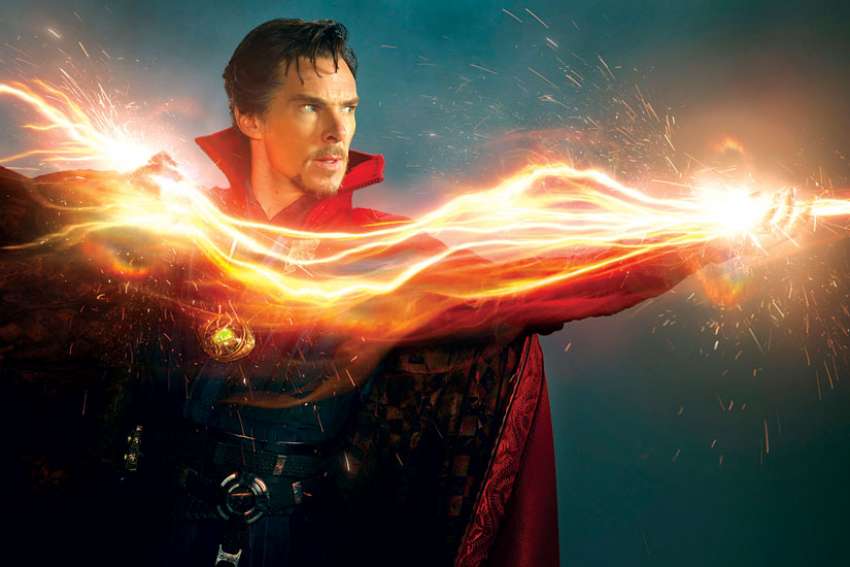Played by the always splendid Benedict Cumberbatch, Dr. Strange is a handsome, ultra-cool, brilliant neurosurgeon. He is also unbearably arrogant and something of a first-class jerk. While racing in his Lamborghini to an evening soiree, he runs his car off the road and suffers grievous injuries to his hands. Despite the heroic efforts of the best surgeons, his fingers remain twisted, incapable of performing the operations which made him rich and famous.
In his desperation, he travels to a mysterious treatment centre in Katmandu, where people with horrific and irreversible physical damage have, he hears, been cured. There he confronts a bald-pated female figure, played by Tilda Swinton, who claims that she has healed severed spinal cords through the manipulation of spiritual forces. The rationalist Dr. Strange asserts that matter is all there is and that we human beings exist for a brief moment in the context of an indifferent universe.
With that, she shoves him backward and, to Dr. Strange’s infinite astonishment, his astral body suddenly leaves his ordinary body. This is the beginning of his mystical apprenticeship.
What I particularly liked about this confrontation is how it represents a challenge to the comically arrogant scientism of our time, by which I mean, the fallacy of reducing all forms of knowing to the scientific manner of knowing. This attitude, though widespread today through the influence of the “new” atheists, is utterly self-refuting. How, precisely, did the advocates of scientism verify that only empirically measurable things are true?
The coolly arrogant but hopelessly narrow Dr. Strange is an apt representation of the clueless advocates of scientism on the contemporary scene.
In order to participate in the dynamics of the higher world, Dr. Strange has to go through demanding training, not unlike the formation he went through to become a neurosurgeon. But now he has to leave his ego aside and surrender to something he can’t entirely understand. This disciplining of the grasping self, of course, is at the heart of monastic and spiritual traditions. Therefore, in the measure that it reminds young people that there is more to reality than meets the eye and in the measure that it encourages them to embark upon a properly spiritual path, Doctor Strange performs an important service.
However, all is not well with this film from a spiritual point of view, for it stops, as many contemporary movies do, at a sort of way station to the real thing. As in Star Wars, which also features a young man going through a needed apprenticeship, Doctor Strange initiates us into a fundamentally Gnostic space, a realm of spiritual powers, both good and evil, engaged in a never-ending struggle. Dark and light side of the Force, anyone?
To be sure, there are elements of the Biblical story in Doctor Strange, as there are in Star Wars for instance the theme of salvific suffering and embrace of mission on behalf of others. But Gnostic visions always miss the essential teaching contained in Biblical revelation, namely that God is a personal power who can never be manipulated by us and who reigns supreme and victorious over any and all powers of evil. The point of the spiritual life, on the Biblical reading, is not to control the powers through knowledge, but to surrender in faith to the purposes of God.
I’m sure it’s asking too much to expect escapist popcorn movies to get Biblical spirituality right. And if Doctor Strange can beguile young people out of a deadening and self-contradictory scientism, opening them to a world beyond ordinary experience, I say “two cheers for it.”
(Bishop Robert Barron is an auxiliary bishop of the Archdiocese of Los Angeles.)


